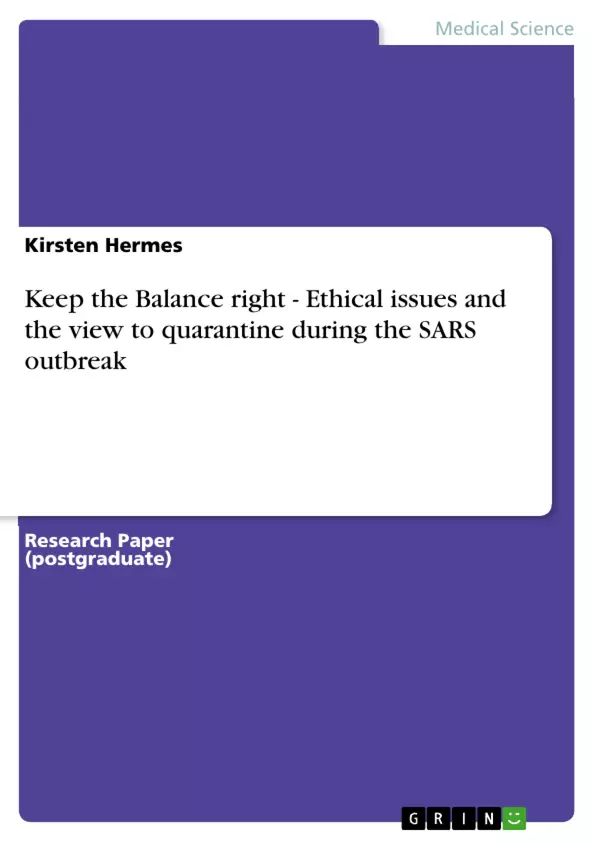INFORMATION: This issue is in fact a final report, NOT A DRAFT
Decision making in public health crises is associated with a high potential on ethical conflicts especially in restricting liberty measures such as quarantine. An effective and acceptable public health coping has the dual role of monitoring compliance and providing support to people in quarantine.
The global 2003 nonmedical response to severe acute respiratory syndrome (SARS) and experiences in various states like China, Vietnam, Singapore or Canada with large – scale quarantine, raised ethical questions in seeking the right balance between the tension of protecting the public`s health and human rights and human needs. The loss of liberty, privacy and free movement as well as experienced psychosocial harm like fear, discrimination and stigmatization were discribed as collateral damage but found problematic, also for further successful voluntary compliance.
.
Inhaltsverzeichnis (Table of Contents)
- Abstract
- Introduction
- Background: Quarantine during SARS
- Discussion
- Ethical Principles
- Conclusion
Zielsetzung und Themenschwerpunkte (Objectives and Key Themes)
This paper aims to explore the ethical complexities of quarantine during public health emergencies, particularly during the SARS outbreak. It examines the tensions between safeguarding public health and individual liberties, focusing on the application of quarantine as a public health tool.
- Ethical implications of quarantine measures
- Balance between public health protection and individual rights
- Impact of quarantine on individual well-being and psychosocial health
- Factors influencing compliance with quarantine measures
- Recommendations for ethical and effective use of quarantine in future pandemics
Zusammenfassung der Kapitel (Chapter Summaries)
- Abstract: Provides an overview of the paper's focus on ethical conflicts associated with quarantine measures, highlighting the need for balanced approaches to public health protection and individual rights.
- Introduction: Introduces quarantine as an ancient public health tool, tracing its history and outlining its contemporary uses and challenges. It emphasizes the potential for abuse and discrimination, as well as the emotional reactions it elicits.
- Background: Quarantine during SARS: Examines the implementation of quarantine during the SARS outbreak, highlighting its global impact, duration, and the inconsistencies in its application. It explores the psychological effects of quarantine, including PTSD and depression.
Schlüsselwörter (Keywords)
The key terms and themes of this paper include quarantine, ethics in public health emergencies, severe acute respiratory syndrome (SARS), compliance, individual liberties, psychosocial impact, public health policy, pandemic preparedness, and ethical frameworks.
Frequently Asked Questions
What are the ethical conflicts of quarantine?
The main conflict lies in balancing the protection of public health with the restriction of individual liberties and human rights.
How did the 2003 SARS outbreak impact quarantine policy?
It highlighted the need for psychosocial support and clear communication to ensure voluntary compliance and reduce stigmatization.
What psychosocial harm can quarantine cause?
Quarantined individuals often experience fear, discrimination, depression, and in some cases, symptoms of PTSD.
Is voluntary compliance better than mandatory quarantine?
Public health experts argue that high levels of support and trust make voluntary compliance more sustainable and ethically acceptable.
What ethical principles should guide quarantine measures?
Principles like transparency, proportionality, and the provision of essential needs (food, medicine) are crucial for ethical implementation.
- Citar trabajo
- Dipl. Gesundheitswirtin Kirsten Hermes (Autor), 2007, Keep the Balance right - Ethical issues and the view to quarantine during the SARS outbreak, Múnich, GRIN Verlag, https://www.grin.com/document/114593



